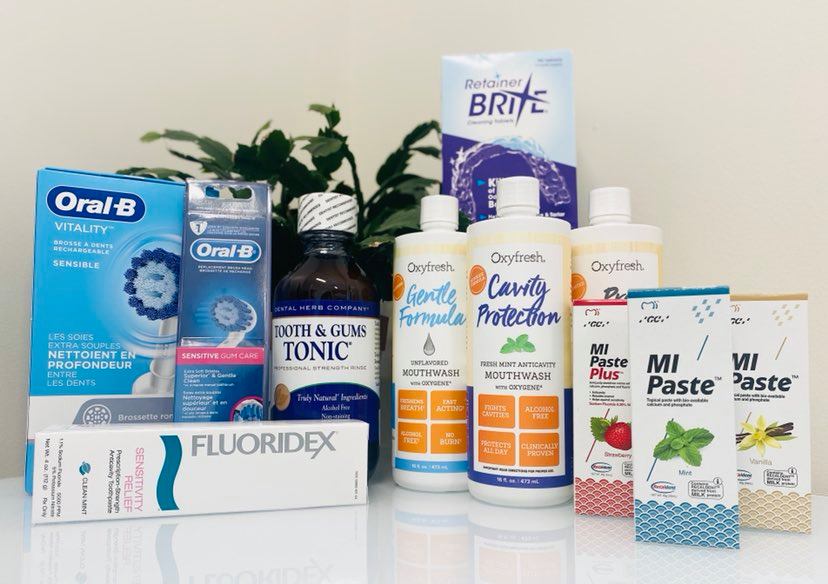
Sep 20, 2022
Dental Hygiene Products We Recommend to Our Patients
Here at Falmouth Dental Arts, we endorse and recommend a variety of professional products to our patients. “Based on our team’s many years of combined experience, we have developed a list of products we think are particularly effective at supporting our patients’ home dental hygiene routines and keeping their teeth and gums healthy in-between visits,” says Ashley Landry, Clinical Director, and Dental Hygienist at FDA. Here’s more information about the products we think can give an extra oomph to your oral health care!
Mouth Rinse
Oxyfresh is a gentle but powerful mouthwash that uses natural ingredients like mint to help keep your breath fresh all day. Oxyfresh is alcohol and dye-free, naturally sweetened, and made in the USA. It’s specially blended with Zinc and Oxygen®, a proprietary bad-breath fighter, to promote oral health while neutralizing bad breath. We offer Oxyfresh in 3 different versions: a gentle mint-flavored Pro-Formula, non-flavored Gentle Formula, and Cavity Protect with the added benefit of fluoride.
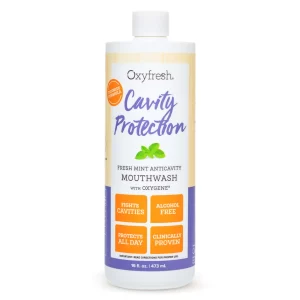
Tooth & Gums Tonic is a natural, professional-strength mouth rinse formulated to reduce oral bacteria and inflammation with pure essential oils. This alcohol-free rinse is blended with essential oils and herbs such as Echinacea and Gotu Kola, known for their anti-inflammatory and breath-freshening properties – a great alternative to other prescription mouth rinses!
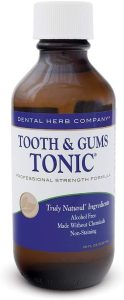
Toothpaste
MI Paste and MI Paste Plus is uniquely-formulated toothpaste fortified with calcium, fluoride, and phosphate that helps replace beneficial minerals lost from the tooth’s structure. MI Paste helps to prevent decay, sensitivity, tooth erosion, and tooth wear while restoring enamel gloss. A great product for patients who experience dry mouth and hypersensitivity as well as for those receiving orthodontic treatment.
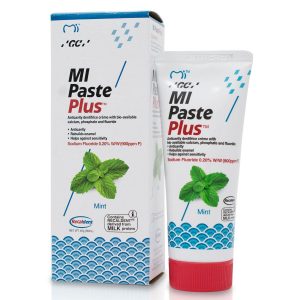
Fluoridex is prescription-strength fluoride toothpaste designed for use at home. It helps to prevent tooth decay and reduce harmful bacteria. Fluoridex is a great addition to your home care routine that helps to strengthen the enamel, reduce tooth sensitivity, and protect your teeth. Used over time, Fluoridex can help strengthen tooth enamel and prevent cavities.
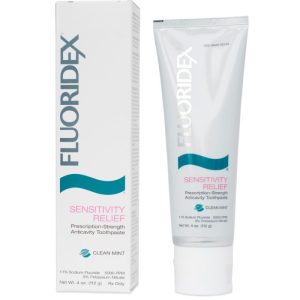
Retainer Cleaner
Retainer Brite is a great way to keep your night guard or other removable appliance, such as Invisalign, clean and ready for daily use. The specially-formulated tablets help protect and preserve appliances while also gently cleaning them. They are simple to use and kill up to 99% of common odor-causing bacteria. They also work to eliminate the cloudy film and plaque buildup when used to clean your retainer every day.
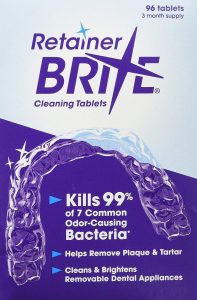
Toothbrushes
Oral B Electric Toothbrushes are designed to give you the best possible tooth cleaning at home. Electric toothbrushes effectively remove plaque while being gentle on your gums. We recommend these electric toothbrushes to our patients for a successful home care routine as they efficiently reduce plaque and prevent gingivitis.
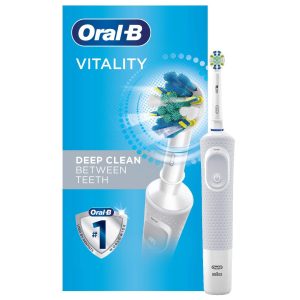
If you are interested in trying one of the products listed above or are wondering which one might be right for you, our team of dental professionals is happy to make a recommendation. Ask us any questions you might have at your next appointment or give us a call at 207.781.5900!
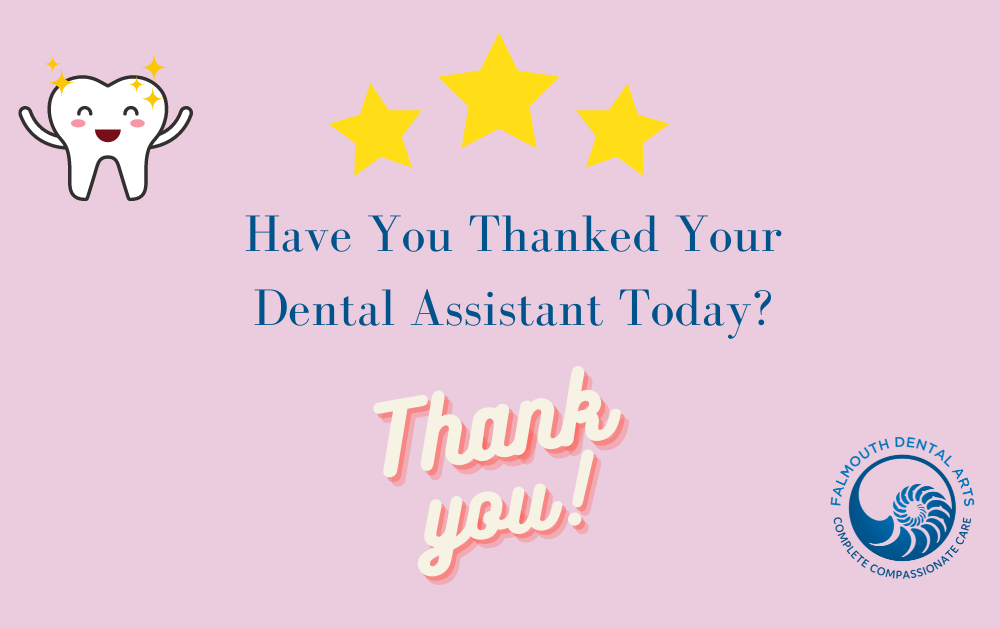
Mar 4, 2022
March 6–12, 2022 is Dental Assistants’ Week, a celebration of dental assistants and the value they bring to our patients and to the FDA team. This year’s theme is, “Passionate about our patients, dedicated to our profession,” and each of our five multi-talented dental assistants exemplify this on a daily basis. They each bring their skills and positive attitudes to our practice, and are always seeking to elevate the comfort and satisfaction of our patients. If you’ve had an opportunity to meet Lisa, Pat, Mary, Mirela, or Chelsey, then you know this to be true! In honor of our fantastic team, we have put together some quotes from our dental assistants themselves, sharing what they love most about their jobs. We appreciate them during Dental Assistants’ Week and every day!
Lisa
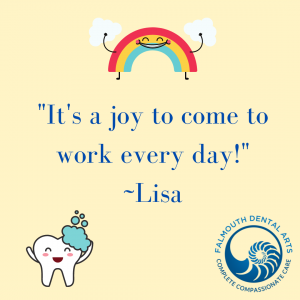
Lisa has been helping patients achieve better smiles for more than 25 years, joining the FDA family in 2019. For Lisa, her joy of coming to work also extends to providing excellent preventive, restorative, and cosmetic dental care for FDA patients. And it is a joy to have her on our team. Thank you, Lisa!
Pat
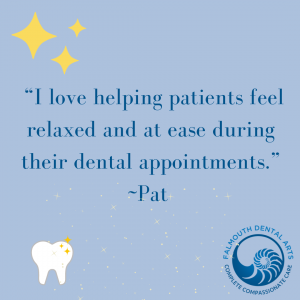
Pat has been a Certified Dental Assistant for over 17 years . She handles patient radiology and assists chairside for cosmetic and restorative procedures. We are grateful for Pat and the compassion she shows our patients. Thank you, Pat!
Mary
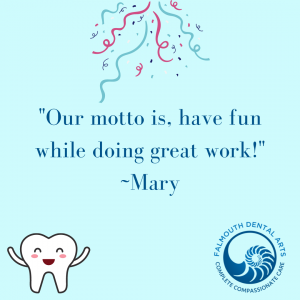
Mary has worked in the dental field since 1995, spending many of those years at Falmouth Dental Arts. Mary enjoys helping people and seeing the results of a successful treatment. We love Mary’s positive attitude and commitment to the team. Thank you, Mary!
Mirela
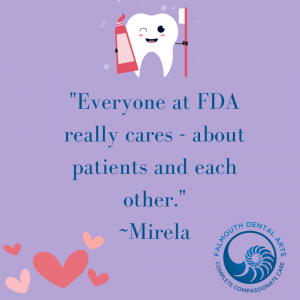
Mirela has worked in the dental field since 2003, joining the Falmouth Dental Arts team in 2017. With a background in pediatric dentistry, Mirela demonstrates exceptional compassion for her patients and team. Thank you, Mirela!
Chelsey
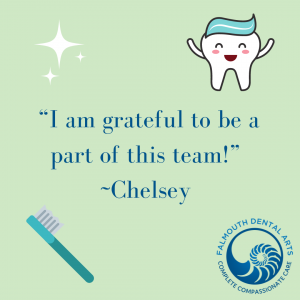
Chelsey joined FDA in 2020. After an experience traveling to Central America on a mission trip to assist a dentist with restorative work, Chelsey realized she wanted to work in the dental field. We are grateful to have Chelsey on our team! Thank you, Chelsey!
Learn more about our fantastic dental assistants and the rest of our team of compassionate dental professionals here.
If you have questions about your oral health or need to schedule your next appointment, feel free to give us a call at 207.781.5900. Our wonderful dental assistants, along with Dr. Brunacini, Dr. Karagiorgos, and the rest of the team, are here to help!

Jun 23, 2021
As a general rule of thumb (rule of tooth?), the American Dental Association recommends brushing your teeth a minimum of two times a day to maintain good dental health and hygiene. You’ve probably heard Dr. Brunacini, Dr. Karagiorgos, and our team of amazing hygienists sing a similar tune at your check ups. That’s because brushing your teeth twice a day is a simple step that all of us can take to ward off plaque, bad breath, and tooth decay. But this month, let’s dig a little deeper… How often should we really be brushing our teeth and when is the best time to do it? Let’s discuss!
Q: Is brushing my teeth twice a day enough?
A: As mentioned, the ADA recommends brushing your teeth at least two times every day, with gentle strokes, for two minutes each time, and we agree! We also recommend using a fluoride toothpaste, a toothbrush with soft bristles – we particularly recommend electric toothbrushes, as well as flossing at least once per day.
Q: Should I brush my teeth before or after I eat breakfast?
A: It is always a good idea to brush your teeth in the morning due to the growth of bacteria that happens overnight. But should you brush before or after you eat and drink? Either one is fine, but if you prefer to brush after you’ve had breakfast, the ADA recommends waiting at least 60 minutes, especially if you’ve had something acidic like orange juice or coffee. This gives your saliva a chance to rinse your teeth and restore your mouth to its natural pH.
Q: Should I brush my teeth after every meal?
A: While it’s not necessary, brushing your teeth after having a high-carb or high-sugar snack is never a bad idea! Again, you should wait about an hour after eating before you brush.
Q: How often should my kids brush their teeth?
A: Two times per day is also the minimum for kids, but if your child wants to brush more, there is no reason not to, as long as he or she brushes gently and with a soft toothbrush. If your child or teen wears braces, brushing after every meal is recommended.
To make sure younger children brush their teeth for a full two minutes each time, try a toothbrush with a fun timer or teach them a two-minute song to sing or hum while brushing. You can also download a fun toothbrushing app on your phone.
Q: Does it matter when I brush my teeth in the evening?
A: Brushing right before bed each night is a great habit to get into, as it removes the bacteria that has accumulated in your mouth during the day while reducing the buildup of plaque while you sleep.
Do you have more questions about how to best care for your oral health? Give us a call at 207.781.5900 — We are your partner in oral health care and are happy to answer any and all questions you may have!
Happy Brushing! 🙂
Oct 15, 2019
Fluoride and flavors and flip-caps oh my! If you’re staring down the selection of toothpastes and wishing there was a Yellow Brick Road leading to the perfect one, you’re not alone. Luckily, your friends at Falmouth Dental Arts are here to help!
 First and foremost, as you’re examining the tube of toothpaste, keep your eye out for two key details: the ADA seal of approval and fluoride content. The American Dental Association tests the safety and effectiveness of toothpastes on the market, and gives its seal to those pastes which pass the test with flying colors. Varieties without the ADA seal either have not been tested, or have not passed the ADA tests. Either way, choosing a product without the seal is a gamble for your teeth. Take the safe bet, and look for the ADA seal.
First and foremost, as you’re examining the tube of toothpaste, keep your eye out for two key details: the ADA seal of approval and fluoride content. The American Dental Association tests the safety and effectiveness of toothpastes on the market, and gives its seal to those pastes which pass the test with flying colors. Varieties without the ADA seal either have not been tested, or have not passed the ADA tests. Either way, choosing a product without the seal is a gamble for your teeth. Take the safe bet, and look for the ADA seal.
Most toothpastes contain fluoride, a chemical compound with a variety of uses. In the dental realm, fluoride protects your teeth from decay by reinforcing your enamel. Fluoride has been used as an active ingredient in toothpaste for over a century, and has been introduced into a majority of city water supplies to improve oral health in the community. In recent years, fluoride has become a bit of a hot topic because it is toxic when ingested in large doses. Additionally, high levels of fluoride can lead to fluorosis: a discoloring of the teeth. However, because over-the-counter pastes contain such trace amounts of fluoride that fluorosis and toxicity are not of concern, Falmouth Dental Arts recommends fluoridated toothpastes.
Dr. Karagiorgos states that “adding fluoride to our water supply has been statistically significant to help to improve oral health in at-risk communities. However, at Falmouth Dental Arts, we believe in a patient’s freedom to choose what goes into their bodies, and whether fluoride is right for them as an individual.”
“Proper oral health maintenance including brushing with any sort of paste, is the best method of reducing the risk of dental decay. Fluoride is not a nutrient, and our bodies have no need for it metabolically. It is very good at doing is killing the bacteria that cause tooth decay. Using it appropriately, in small topical doses such as those found in ADA approved toothpastes and mouthwashes can help to prevent decay, and also to reverse small amounts of acid damage. Acid damage can occur from cavity causing bacteria, acid erosion from reflux or consuming acidic foods.”

Beyond the ADA seal and fluoride content, your selection of toothpaste is entirely up to you! As you narrow down your choice, here are a few additional factors to consider:
1. Sensitivity: most toothpaste brands have a line specifically designed to address tooth and gum sensitivity. Some brands are entirely devoted to helping soothe sensitive teeth. Either way, most over-the-counter sensitivity pastes deliver on their promises to pacify any pain. If your sensitive teeth aren’t responding to an OTC sensitive-specific paste, talk to Dr. Brunacini or Dr. Karagiorgos about prescription strength options.
2. Whitening: Who doesn’t want a brighter, whiter smile? Many toothpastes claiming to possess whitening powers typically do address basic surface stains. However, the different ingredients in whitening toothpastes can cause dental sensitivity over time. Additionally, any sort of abrasive ingredient advertised to whiten your teeth (such as activated charcoal, natural exfoliants, or microbeads) can erode your tooth enamel. Avoid abrasive materials in your toothpaste, and always keep smart brushing techniques in mind. If you’re looking for more intensive whitening, talk to Dr. Brunacini about in-office and at-home options at your next appointment!
3. Options for Kids: For brand new brushers, look for a training toothpaste which does not contain fluoride. When your child understands that toothpaste should be spit out and not swallowed, you can make the switch to a fluoride paste. Fun toothpaste flavors can be helpful if you’re trying to make brushing fun–which goes for children and adults alike!

At the end of the day, the most important thing you can do for your teeth is to brush them properly twice a day! What you use to brush helps or hurts your effectiveness as a brusher, so you do want to choose your tools and pastes with care. Look for a toothpaste stamped with the American Dental Association’s seal of approval. Feel free to choose a toothpaste with a fun flavor and ingredients to address sensitivity or whitening concerns–just avoid any ingredients that might erode your tooth enamel.
If you have questions about proper brushing techniques, or want to have Dr. Brunacini and Dr. Karagiorgos put their stamp of approval on your toothpaste–just ask them at your next dental exam and cleaning! If you have any questions, or to schedule your appointment, please call our office at 207.781.5900
Jun 7, 2018
In recent years, oil pulling has gained a lot of attention as a natural alternative to traditional oral hygiene. Proponents claim that it will whiten teeth, reduce inflammation, and help cure gingivitis. As with our exploration of activated charcoal last month, we support natural and holistic approaches to oral hygiene, so we decided to give this practice a closer look.
What is Oil Pulling?
Oil pulling is an ancient Ayurvedic practice that involves swishing a tablespoon of oil (usually coconut or sesame) in your mouth for 20 minutes every morning. Afterwards, one spits out the oil as one would mouthwash.
Does it Work?
While there are few scientific studies on the efficacy of oil pulling, swishing with oil for twenty minutes a day will certainly do no harm.
“Oil pulling is a good adjunct to regular brushing and flossing to reduce staining on the teeth. We have had a number of patients that have benefitted from adding oil pulling to their home care routine,” says Dr. Brunacini.
Bottom Line
Oil pulling is a practice worth exploring if you are interested in trying something other than mouthwash. However, it should not be a replacement for your regular oral hygiene practices. The American Dental Association (ADA) recommends that to maintain good dental health you should brush twice a day for two minutes with fluoride toothpaste, floss between your teeth once a day, and abstain from using tobacco products.
If you find yourself exploring options for teeth whitening or have questions about your oral health care regimen, please give us a call at 207.781.5900 and we’ll be happy to arrange an appointment!

















